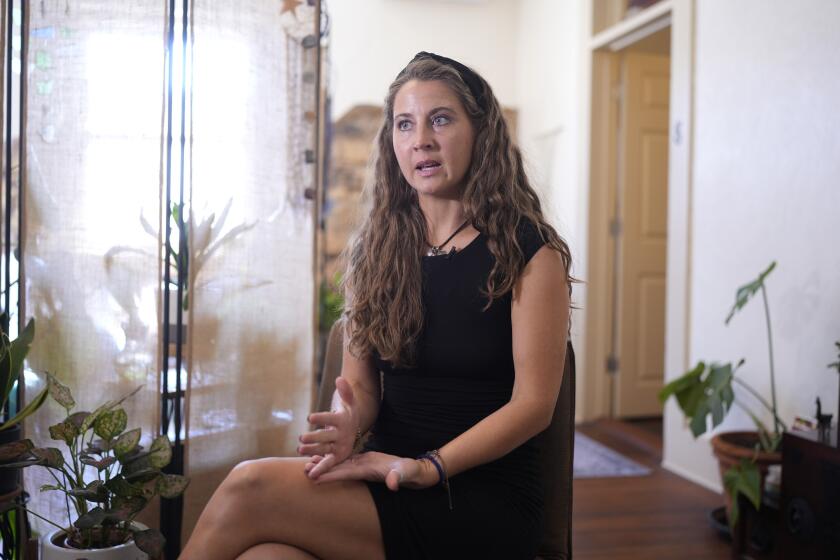Coordinated Blasts in Philippines Kill Seven, Wound More Than 100
Three bombs apparently planted by Islamic militants exploded in the southern Philippines and the Manila financial district Monday evening, killing at least seven people and injuring more than 100.
The extremist Abu Sayyaf group, best known for its high-profile kidnappings of foreigners, claimed responsibility for the blasts, calling them a “Valentine’s gift” for President Gloria Macapagal Arroyo.
“Our latest operations -- planned and executed with precision by the gallant warriors of Islam -- is our continuing response to the Philippine government’s atrocities committed against Muslims everywhere,” said Abu Solaiman, an Abu Sayyaf leader, in a phone call to a radio station. “We will find more ways and means to inflict more harm to your people’s lives and properties.”
The bombs, which exploded within an hour of one another, were apparently in retaliation for a government crackdown on Muslim rebels on the southern Philippine island of Jolo, long a militant stronghold.
Thousands of government troops aided by aerial bombing have been battling Abu Sayyaf fighters and allied Muslim separatists on the remote island for more than a week. Authorities say more than 100 rebels and more than two dozen soldiers have been killed.
The fighting began when soldiers killed a couple and their 14-year-old son. The military said that the parents were Abu Sayyaf terrorists and that the boy had been caught in crossfire. Rebels said the three were civilians and retaliated by attacking troops on the island.
“The operation is going on and we will pursue them without letup,” said Lt. Gen. Alberto Braganza, commander of military forces in the southern Philippines.
The first of the bombs Monday went off outside a shopping mall in the southern Philippine city of General Santos about 6:30 p.m. Police said the bomb was hidden in a bag at a taxi stand near the entrance. The blast killed at least three people and injured more than three dozen others.
Moments later, a bomb exploded at a bus terminal in Davao City, killing a 12-year-old boy and injuring at least eight others.
About 20 minutes after the blast, Solaiman called DZBB radio and said Abu Sayyaf was responsible for the blasts.
“You can attribute this to us,” he said. “There is one more to come.”
About 7:30 p.m., a bomb went off on a bus beneath an elevated train station near the Intercontinental Hotel in the Manila financial district of Makati. The bus exploded into flames, killing at least three people and injuring more than 60.
The Valentine’s Day blasts were reminiscent of near-simultaneous bombings in Manila on Dec. 30, 2000, that killed 22 and signaled the escalation of operations by Jemaah Islamiah, a regional terrorist group that later carried out the Bali nightclub bombing in Indonesia that resulted in more than 200 deaths.
Like Jemaah Islamiah, Abu Sayyaf has long-standing links to Al Qaeda. In recent months it has attempted to recast itself as a terrorist group with the ability to operate throughout the country. Last February, the group bombed a ferry as it departed Manila, killing at least 116 in the region’s deadliest terrorist attack since the 2002 Bali bombing.
In 2001, Abu Sayyaf raided a tourist resort on the island of Palawan and kidnapped a group of hostages, including three Americans. The militants later beheaded hostage Guillermo Sobero of Corona, Calif., on this nation’s Independence Day, calling the killing a holiday gift for President Arroyo.
The Bush administration announced two years ago that it would send U.S. troops to Jolo to root out Abu Sayyaf, but the planned deployment was quickly canceled because it would have violated a Philippine constitutional ban on operations by foreign troops.
Since then, the U.S. has focused on training Philippine units to carry out operations against the rebel fighters. Washington has listed Abu Sayyaf as a terrorist organization.
Staff writer Paddock reported from Singapore and special correspondent Jacinto from Zamboanga City. Special correspondent Sol Vanzi in Manila contributed to this report.
More to Read
Sign up for Essential California
The most important California stories and recommendations in your inbox every morning.
You may occasionally receive promotional content from the Los Angeles Times.








